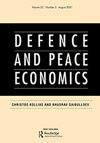民主、军费开支和经济增长:一个异质视角
IF 1.6
3区 经济学
Q2 ECONOMICS
引用次数: 3
摘要
本文章由计算机程序翻译,如有差异,请以英文原文为准。
Democracy, military expenditure and economic growth: A heterogeneous perspective
ABSTRACT Countries with different democratic levels tend to show various degrees of emphasis on military expenditure and a consensus can hardly be reached on the economic effect of democracy and military expenditure. By applying a panel vector autoregressive (PVAR) approach, this article examines the potential dynamic and endogenous relationships among democracy, military expenditure and economic growth of 126 countries from 1990 to 2020. Furthermore, the k-means clustering algorithm is employed to account for the heterogeneous interaction between democracy and military expenditure in different countries. The empirical results reveal that the strong positive impact of democracy and the negative effect of military spending on economic growth exists in the full sample and the cluster of countries with low democratic levels and a high military burden. For democratic countries with low military expenditure, there is a more significant and negative impact both of military expenditure on democracy and vice versa.
求助全文
通过发布文献求助,成功后即可免费获取论文全文。
去求助
来源期刊

Defence and Peace Economics
ECONOMICS-
CiteScore
4.00
自引率
18.80%
发文量
45
期刊介绍:
Defence and Peace Economics embraces all aspects of the economics of defence, disarmament, conversion and peace. Examples include the study of alliances and burden-sharing; military spending in developed and developing nations; arms races; terrorism; country surveys; the impact of disarmament on employment and unemployment; the prospects for conversion and the role of public policy in assisting the transition; the costs and benefits of arms control regimes; the arms trade; economic sanctions; the role of the United Nations.
 求助内容:
求助内容: 应助结果提醒方式:
应助结果提醒方式:


